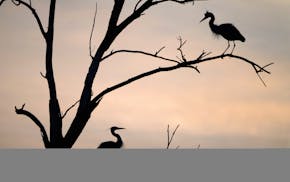Most athletes who torch their careers damage only themselves -- and, often, their earning ability. Eight North Dakota State University football players might have done that and much more: They wrecked the hopes and dreams of thousands of North Dakotans when they allegedly committed voter fraud this summer.
Four of the eight players are starters on the defending national champion Bison team that will travel to Colorado State this weekend. All will be allowed to play, Bison coach Craig Bohl told the Forum of Fargo-Moorhead, despite misdemeanor charges expected to be filed against the players that are punishable by up to a year in jail and $2,000 fines.
Which is peanuts compared to the hundreds of thousands of dollars that could be lost by a coalition of conservation and environmental groups that includes the Nature Conservancy, Ducks Unlimited, Pheasants Forever and the National Wildlife Federation and scores more, including many small-town North Dakota rod and gun clubs.
The groups already had made deposits on, or otherwise committed to, radio and television ads that were expected to run this fall across North Dakota in support of a constitutional amendment to protect the state's land, water and outdoor heritage.
The measure is similar in many ways to the one Minnesota voters passed in 2008, except the source of revenues in North Dakota -- an estimated $88 million a year for flood control, wildlife and wetlands, and to "encourage beginning farmers and ranchers" -- would be a portion of an existing tax on oil pumped in northwest North Dakota, and a tax on oil and gas production.
Supporters of the idea had two ways to get the amendment proposal on the North Dakota ballot this November. They could ask the Legislature, or they could amass about 27,000 signatures of state residents on a petition for submission to the secretary of state.
Legislative support for the idea was sought first. But the proposal stalled in Bismarck, as many expected it would, given the Legislature's long record of indifference toward conservation.
Thus a petition drive began in January that supporters believed would cost upward of $1 million, including the advertising campaign planned in the run-up to the election.
Petitions were distributed to trained volunteers, some of whom went door to door. Others positioned themselves in public places such as shopping centers.
Additionally, an Iowa company was hired to contract with paid workers who would gather petition signatures. The eight current NDSU football players, as well as one former player and three others expected to be charged, were among those paid $9 an hour by the Iowa company to gain valid signatures.
The petitions themselves were very specific and detailed exactly the nature of the petition drive, the amount of money involved, and how the money would be spent.
Each volunteer or hired worker was instructed to explain the constitutional amendment idea to people they met, then ask them to sign the petition, listing in addition to their names, their North Dakota addresses.
So far, so good, and in all, 37,785 signatures were turned into the North Dakota secretary of state. The surplus of signatures was gained because backers of the conservation fund idea knew some names inevitably would be ruled invalid. Perhaps their addresses would be incorrectly listed, for example. Or for other reasons their names couldn't be independently verified by state officials.
Instead, state investigators found that a number of names on petitions gained in the Fargo area were from people who didn't actually sign the petition.
According to published reports, the names were instead taken from phone books, and the signatures forged. The secretary of state ruled the alleged fraud made the initiative ineligible for the ballot.
The irony -- and the pity -- is that polling done by the conservation groups in advance of the petition drive showed widespread support among North Dakota voters for the conservation amendment.
Now the best the conservation coalition can do is begin another petition drive in January for placement, perhaps, on a June 2014 statewide ballot.
Stephen Adair heads up the regional Ducks Unlimited office in Bismarck and chairs the conservation coalition backing the amendment.
"We're extremely disappointed that this alleged fraud occurred," he said in a statement. "We had no desires to be on the ballot in any other than a pure and honest way."
Dennis Anderson • danderson@startribune.com
Anderson: Anglers protesting tough new Mille Lacs rules are wrong

Anderson: Courts, not politicians, should rule on Red Lake, White Earth lands

Anderson: Multimillion windfall gets invasive carp deterrent moving
![A young whitetail deer searches for food as another blanket of snow coats the arrowhead. ] Minnesota -State of Wonders, Arrowhead in Winter BRIAN PETE](https://arc.stimg.co/startribunemedia/WK32UWWY6FKNWJUIYCJ6ZPT4AU.jpg?h=91&w=145&fit=crop&bg=999&crop=faces)
Anderson: In NE Minnesota, DNR staff, habitat and deer all decline

